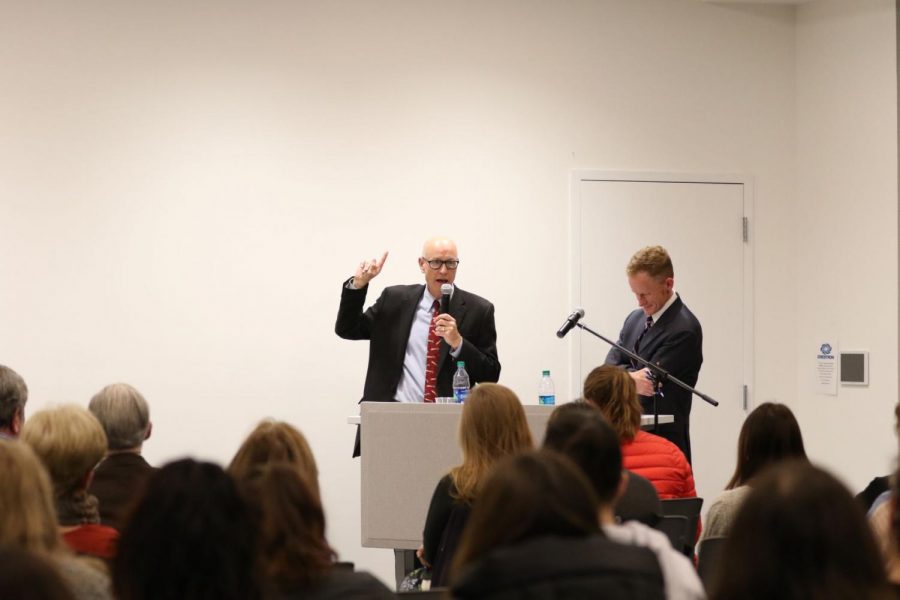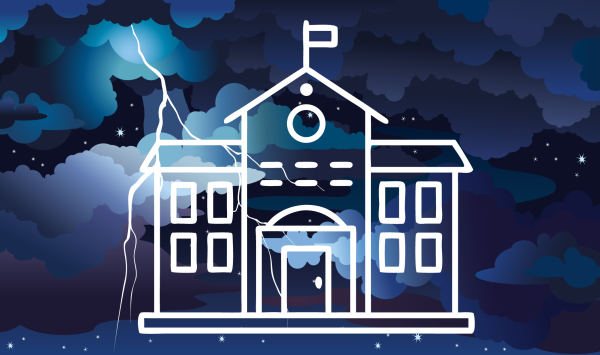Dan Barry shares chilling story of lost children
Even the most ordinary people have the power to make a change and right a wrong, no matter how long ago it may have happened.
This was one of the strongest messages presented by Dan Barry when he spoke to a crowd in the Mary Tefft White Cultural Center in the university library on Tuesday, Nov. 14. The talk was an installment of the yearlong series of “Talking about Race, Gender and Power.”
Barry is a New York Times columnist and reporter who often writes about people who do not have the power at their disposal to get their stories out. He focuses on giving a voice to the voiceless. In the case of his most recent story, The Lost Children of Tuam, he is able to give a voice to the dead.
In Tuam, Ireland, seven acres of land exist where a now demolished St. Mary’s Mother and Baby Home once stood. Countless numbers of these homes existed and held unmarried mothers and their children. The Home in Tuam was run by a Catholic religious order of nuns called the Congregation of Sisters of Bon Secours. The women who were sent to these homes arrived with their newborns, but often left without them, and never had the chance to see them again.
The Home became a place like this due to the way the public felt about pregnancies out of wedlock at the time. It was viewed as a huge dishonor for both the families and the local pastors. Although many of these women were raped and sometimes impregnated by a relative, the responsibility and shame was still placed on the woman. Oftentimes, the girl would flee to England or hide her pregnancy so that the family could pretend the child belonged to a married sister. If neither of these options were viable, then she was sent to the Tuam home.
It was not until Catherine Corless, a woman who would be viewed by many as fairly “ordinary,” delved into the dark past of the Home that the horrible truth was uncovered.
In the 36 years the Home was open, 796 “illegitimate” infants and children died, and none of these children were given a proper burial. It was found that many of the children died due to lack of care and suffered from illnesses, including: measles, meningitis, whooping cough, and severe undernourishment.
It was not at all easy for Corless to get this information. Seeing as she was not a journalist, she had no credentials, and any information on the Home was nowhere to be found. Upon discovering this, she turned to the local people for help. Through this search, Corless heard a story of two boys who found the bones of children while playing on the grounds of the old home in the 1970s.
In December of 2012, Corless wrote an essay about her findings of the Home that appeared in the historical journal of Tuam. It addressed the missing burial records, and explored the possibility that these children’s bodies were buried on that very property where the Home once stood.
Corless prepared for backlash from the government and townspeople, but it never came. There was no acknowledgement that her article was even published.
Despite being a very introverted, “ordinary” person, Corless felt she had a duty to the children whose young lives were so carelessly taken. She used the anger she was feeling and broke out of her shell to tell their stories. Eventually, it became “the talk of Ireland,” as stated in Barry’s story.
After bringing the story to America, it has made a significant impact on readers, despite the many other things in the news these days, from the Las Vegas shooting to the Harvey Weinstein-propelled sexual assault stories.
Barry emphasized that the story of the children is relevant no matter what country a person may live in. The subjugation of women is a universal problem that still very much exists, and Corless, an “ordinary” woman, helped bring this story to people’s attention.
Several times throughout his talk, Barry described Corless as “heroic,” and explained that when he saw her story, he saw an opportunity for something larger than what was being reported.
Senior Meghan Smith, an Irish Catholic herself, saw the video of Tuam playing in the Mary Tefft White Cultural Center while studying at table nearby and decided to sit in on the talk.
“It was really interesting and I’m glad I did,” Smith said.
In an interview with The Hawks’ Herald, Barry said he wants this story to make people more aware not only of the subjugation of women, but also that we can all make a difference. He brought the conversation back to Corless, who held no official position of power but was still able to bring attention to a horrible story that needed to be told.
“I think that’s a lesson for all of us, that we all have a voice,” Barry said.






